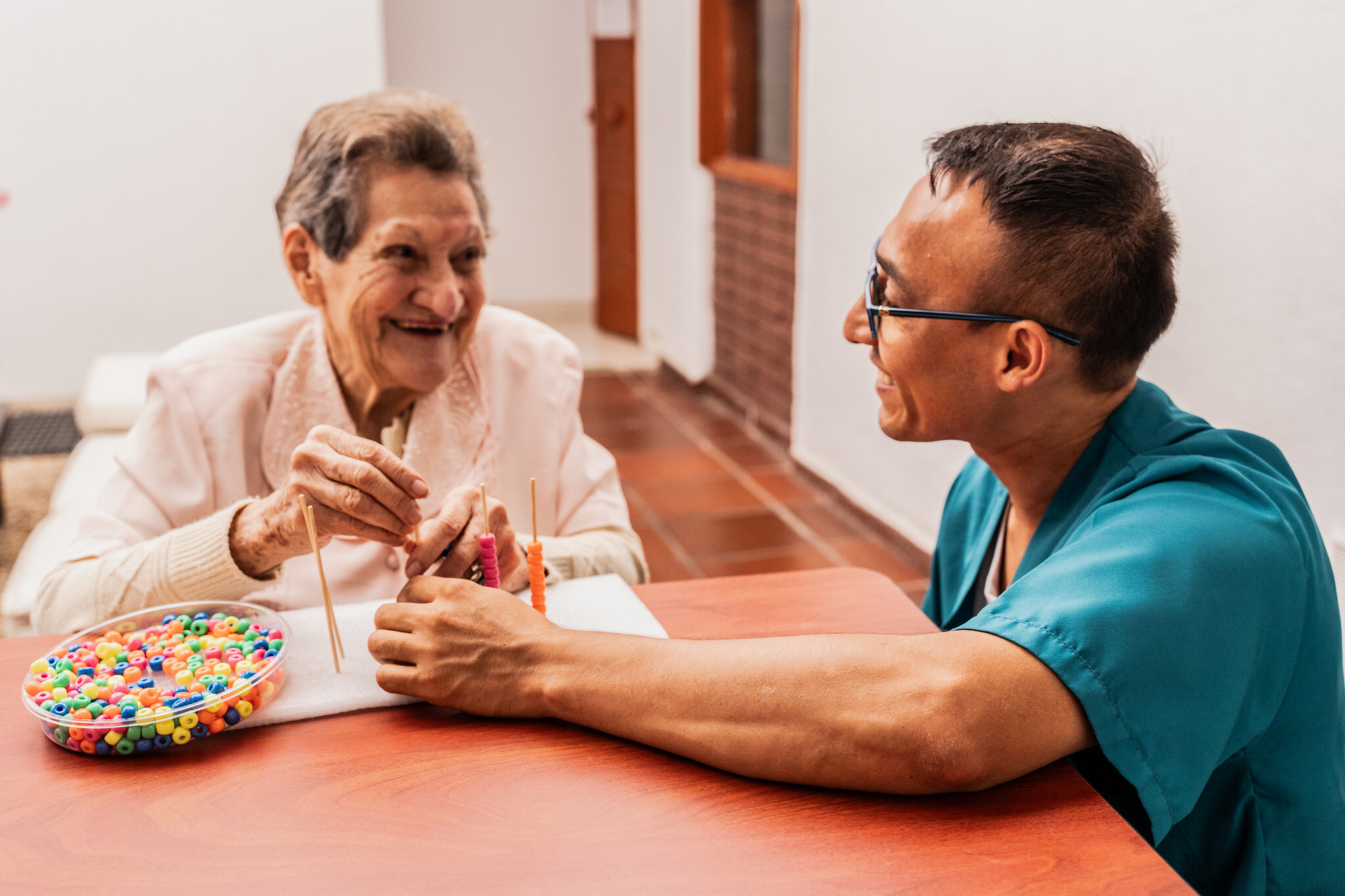24 October 2024
Stories
| Aged Care Homes
Download this article as a PDF.
Dementia is a brain condition that affects a person’s mood, memory, thinking and behaviour. It is not a normal part of aging; however, it is more common after the age of 65. Dementia Australia says that more than 421,000 Australians live with dementia. It is the leading cause of death for women, and the second leading cause of death overall*. There are treatments for the symptoms of dementia but no current cure. It is no easy task to care for a loved one with dementia.
This article is an essential guide for family members and carers on that journey. We look at the kinds of support services available, including dementia-specific aged care homes, dementia-focused respite care, and how to build your healthcare team as the condition progresses.
*Dementia Australia 2024.
In this article:
- Collaborating with dementia-specific healthcare professionals: We look at building your team as the condition progresses.
- Managing daily activities and personal care: Find out how to maintain health and wellbeing.
- Communication techniques for people living with dementia: Learn important communication techniques.
- Utilising support services and resources for caregivers: We list the support available for caregivers of people living with dementia.
- Planning for future care needs: Advance care planning brings peace of mind during the later stages of dementia.
- Dementia-specific aged care homes: Know what to look for when it comes to choosing an aged care home for your loved one living with dementia.
Collaborating with dementia-specific healthcare professionals

Caring for someone living with dementia is one of the most rewarding and challenging things you can do. The role can become overwhelming at times, and it’s important to know you are not alone.
From national organisations such as Dementia Australia to other care services, that maintain a dementia-specific care approach, like BaptistCare, you can access the advice, counselling, support groups, and practical assistance that both you and your loved one need.
When partnering with health professionals in the care of your loved one, it’s important to ensure that your provider’s approach is heavily person-centred. Dementia can present differently from person to person, and your loved one’s needs will be unique.
They should work to provide dignity at every stage of your loved one’s care journey. At BaptistCare, we offer dementia-specific aged care homes, home care, and respite programs where our team members are trained and educated on the condition. Our People First approach promotes independence, quality of life and a sense of belonging. We support people with dignity and respect, whether they are independent, have complex clinical needs, right through to end-of-life care.
Your dementia-specific health care professionals will help to implement strategies to support you and your loved one. This multidisciplinary support team will grow to accommodate the changes the condition brings. Your team will be best placed to help manage behavioural and physical changes with treatment, medication and therapy.
Managing daily activities and personal care

Maintaining independence is an important part of dementia care, and a healthy and active lifestyle will contribute to overall health and wellbeing. However, as the condition progresses, people with dementia and their carers will require more physical help to manage daily activities and personal care. Symptoms will eventually impact the ability to perform everyday tasks, like washing toileting, cleaning and mobility. Services like home care can provide significant relief to both carers and individuals.
Maintaining health and wellbeing
At BaptistCare, we promote wellbeing and independence of our residents living with dementia by promoting regular movement and good nutrition, as well as proven therapies such as music, art and technology. Here are some positive daily actions that you can build into your routine:
- Engage in different activities to remain active – such as getting involved in our lifestyle program offerings.
- Change it up – add music and movement and make it fun!
- Make sure meal times and snacks are part of your daily routine.
- Emphasise movement and engagement at regular intervals throughout your day – when in doubt, go for a walk together!
- Manage other health conditions well through lifestyle and diet.
- Monitor weight and seek professional advice if it changes.
- Maintain good self-care and oral health.
- Regularly participate in meaningful conversations and activities.
- Engage in stimulating therapies using music, art or technology.
Communication techniques for people living with dementia

Effective communication is another important consideration for those caring for people living with dementia. It is why BaptistCare teams incorporate dementia-trained healthcare professionals and carers who understand the unique challenges and common frustrations that people living with dementia face.
The condition often impacts the way one communicates and knowing how to handle dementia in aged care means adapting strategies to ease the confusion and frustrations of the person experiencing the change.
Here are some tips for dementia-aware communication that you can adopt:
- Make sure you have the person’s attention by touch or name before starting to talk.
- Reminisce about the past often and with joy.
- Speak calmly, be patient, and take time to really listen.
- Maintain a two-way conversation for as long as possible.
- Limit distractions before conveying a message.
- Keep the message simple and ask clear questions.
- Maintain a sense of humour.
- Make overwhelming tasks easier by walking them through smaller, manageable steps.
- Acknowledge feelings, and distract or redirect to a new activity if needed.
- Provide comfort through affection and reassurance.
- Tune in to non-verbal cues.
Utilising support services and resources for caregivers

At BaptistCare, we have the pleasure of working closely with people who care for their loved ones with dementia. Many carers have shared the importance of acknowledging when they need help and seeking the right support.
As a carer, it’s important to incorporate some self-care into your weekly routine. This could include:
- Eating nutritious food and exercising often.
- Spending time with friends.
- Participating in the hobbies you love.
- Seeking relaxation through yoga or meditation.
You should feel supported in developing strategies and skills to overcome the challenges associated with caring for someone living with dementia. Below is a list of some support services available.
- Speaking with your General Practitioner
Look after your own physical and mental health to ensure you can continue to care for your loved one. Your General Practitioner can help direct you to the health services available in your area to help you do so. These strategies for self-help continue to be important even when your loved one enters dementia-specific aged care or dementia respite. - Seek respite in a way that works for you
BaptistCare offers compassionate respite care – both day and night – in dementia-specific aged care homes to ensure you can earn some well-deserved rest, while your loved one receives the 24/7 care they need. We also offer social day programs and planned activity groups, which include dementia-specific care in a safe and engaging environment. You can relax, knowing our caring staff are providing personal care, continence management, assistance with medication and dedicated care management for your loved one depending on their unique needs. - Empower yourself through education
You can access educational resources and webinars to help you learn more about the condition and care you’re required to give. Understanding the challenges associated with the condition mean you can better equip yourself to navigate changes in your loved one’s behaviour as dementia progresses. You can also learn proven strategies to help support your loved one and yourself, and explore local services that are available to you. At BaptistCare, we host Refresh Retreats to provide carers with education, support and respite. - Get dementia-specific counselling support
You can access online and in-person support services specifically designed for carers. Carer Gateway is a national network of providers who help carers access in-person, phone and online support services - Join a support group
Carer support groups connect family members and people in your local area or through social media. Support groups enable you to share your story and receive support and advice from people who have lived experiences and deep understanding of the different stages of the condition and the challenges you face.
| Support Group | Website | Phone |
| My Aged Care | myagedcare.org.au | 1800 200 422 |
| Dementia Australia | dementia.org.au | 1800 100 500 |
| Carer's Australia | carersaustralia.com.au | 1800 242 636 |
Planning for future needs: dementia and aged care

As dementia progresses, your loved one will become more reliant on you to make decisions surrounding finances, health care, and living arrangements in aged care homes. Start the conversation about Advance Care Planning well before the condition progresses to ensure you understand your loved one’s wishes, and have the permissions required to grant them, when they no longer have the capacity to make such decisions themselves.
This creates peace of mind for both you and your loved one, as without consent you may not be able to gain access or make change once their health deteriorates.
Consider the following areas:
- Get permission to act on the person’s behalf with third parties such as doctors, banking, government health bodies, lawyers, and insurance companies.
- Consider transferring power of attorney to make decisions for legal, finance and tax matters, and funeral and burial arrangements.
- Explore options for in-home care, dementia respite, and permanent aged care long before they are required.
Choosing a dementia-specific aged care home

Knowing your loved one is valued, respected and cared for when it comes to the advanced stages of dementia makes all the difference. Find a dementia-specific aged care home that offers personalised care and the secure, safe environment required to keep your loved one safe.
Our dementia care communities accommodate residents in single rooms with ensuites, indoor and outdoor communal areas, that maximise independence while ensuring safety and security.
Beyond secure homes and 24-hour care, life is also about being able to do the things residents want to do and having fun! At BaptistCare, we are big on encouraging purpose, and connecting people socially, culturally and spiritually. Our lifestyle teams are able to support individuals living with dementia in a way that they can live life their way.
We offer a wide range of activities and special programs, including science-backed programs such as music therapy and sensory therapy. These are designed to:
- enable active minds, bodies and senses,
- build and maintain connections – culturally, within the community, socially and spiritually,
- offer fun, purpose and celebration,
- and reduce agitation and improve communication.
Ensuring supportive environments for dementia
At BaptistCare, our dementia-specific aged care homes include way-finding cues and orientation landmarks and features. You will see some homes using personalised memory boxes to help residents identify their rooms and invitational signs to prompt participation in leisure activities.
Dementia-informed environments and aged care homes should provide a space that enables residents to live well, supporting the reduction in behavioural and psychological symptoms that people living with dementia face. BaptistCare is committed to responding in a way that limits the use of restraints and meets emotions and needs unique to the individual.
Dementia-specific programs in aged care
Scientific research has proven that certain therapies help to stimulate the brain, increase memory and encourage engagement when it comes to dementia.
At BaptistCare, we engage volunteers, allied health professionals and professional care staff to offer a range of services that enhance the wellbeing of people living with dementia.
Such therapies include:
- Music therapy
Music is a valuable tool to help connect with people diagnosed with dementia. It can be used to encourage participation in games, and engagement with one another. Rhythm is one of the last senses that is affected by dementia, this can tap into movement and help connect with the individual. Dance therapy and playing music familiar to their generation has been proven to spark memory and activity. - Art therapy
Art therapy can be a very valuable tool when looking after someone with dementia. People who may not have been artistic before their diagnosis can become very creative. Painting, drawing, and crafting can become a rewarding activity that is immersive and calming for the individual, allowing them to live in the moment. Pictures can also help stimulate memories and awareness. - Technology
Utilising technology can be a great resource for people living with dementia. Devices like iPads can host brain stimulation games and tools that are easy to use. At BaptistCare, dementia-specific resources also include tools such as animated dogs and cats, which are realistic robots that respond to touch and sound. It’s backed by scientific research, to stimulate and connect with people living with dementia.
Find BaptistCare aged care services near me
If you would like to know more about BaptistCare residential aged care services, why not chat with one of our friendly team – we’d be happy to talk with you about your situation and care needs and can arrange a tour around your nearest BaptistCare residential aged care home.
Use our simple online search tool to explore BaptistCare Aged Care Home locations across NSW, ACT and WA.
Click the link below to learn more about BaptistCare services:
Residential Aged Care | MyTeam | Understanding Aged Care | Financial Guide | Find a centre
Disclaimer of Liability
The material contained in the website is provided for general use and information purposes only. This website is not a substitute for independent professional advice. For further information, please see our Website Statement.
